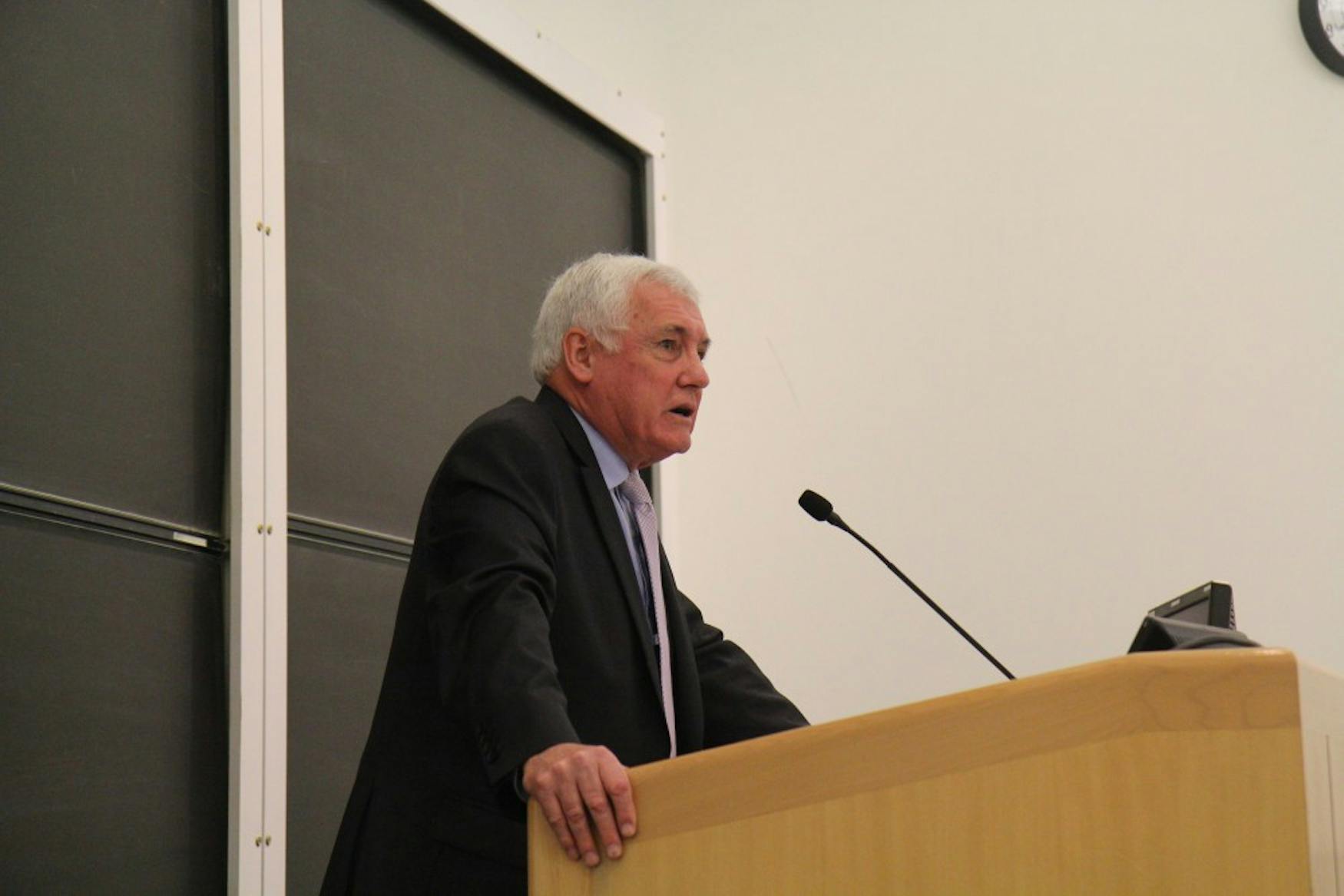Former adjunct professor focuses on capital punishment
Yesterday evening, William J. Leahy, a former Massachusetts public defender and a former adjunct professor in Legal Studies at Brandeis, asserted his conviction that “the death penalty is always and everywhere morally indefensible” at a talk he gave as part of the 30th anniversary Joshua A. Guberman Lecture series.
Overall, the use of capital punishment is currently in decline, said Leahy at his talk. He cited statistics from the Death Penalty Information Center, which specified that whereas about a decade ago only 12 states prohibited the death penalty, 18 states have now passed legislation prohibiting capital punishment entirely.
He also explained that the number of executions in the United States has declined from a high of 98 in 1999 to 39 in 2013. He projected that there would be a likely maximum of 35 executions this year, which he noted would be a record low since the Supreme Court decision of Gregg v. Georgia affirmed the use of capital punishment in 1976.
Leahy mentioned that imposed death sentences have declined from 277 in 1999 to 79 in 2013, and that while 32 states nominally retain the death penalty, only 19 have actually employed the death penalty, executing only 1,390 people since 1976. Leahy then spoke of the ineffective deterring and punitive effects of the death penalty in the U.S. He cited the example of California, which, as of July 1, had 745 people on death row, with only 13 people executed by the state since 1976. He noted that as of mid-July of this year, California’s Supreme Court ruled its death penalty unconstitutional because the lengthy delays between the imposition of the death sentence and the statistically slim possibility of execution, which “destroyed the deterring and retributive purposes that are essential to the death penalty’s constitutionality.”
In outlining the argument made in favor of capital punishment, Leahy quoted writer and attorney Scott Turow’s book Ultimate Punishment: “The justice [the families of victims] seek is the same kind embedded in the concept of restitution. … It is unconscionable and infuriating that after all the misery the murderer has wrought, he still experiences many of the small joys of existence and thus in some measure, his life and his family’s is better than the victim’s and theirs.” Leahy further quoted Turow, saying that, in principle, the use of capital punishment “makes an unequivocal moral statement.”
Despite Turow’s notional support of the death penalty, Leahy noted that Turow ultimately voted for abolition of capital punishment. Leahy explained that Turow opposed the use of capital punishment because he believed that the potential breaches of justice associated with its implementation ultimately outweighed its positive retributive and deterrent effects.
Leahy quoted Turow, stating that effecting capital punishment “places an enormous burden of precision on the justice system... If we execute the innocent or the undeserving, then we have undermined, not vindicated, our sense of moral proportion and the clear message that capital punishment is meant to send.” Leahy resolutely stated that “we have not come remotely close to achieving this bedrock requirement.”
Leahy then referred to a legal case in Massachusetts wherein one man was sentenced to death for two murders, while another man, who was facing the death penalty in multiple states, was allowed to plead guilty to 10 murders for a life sentence. The man who had committed two murders had previously attempted to turn himself in to the FBI, but his call was ignored.
The man who received the life sentence was a notorious career criminal whose testimony of his crimes was thought to be beneficial to the prosecution of a rogue FBI agent.
“The incongruity of the sentence, underscores the illusion that the death penalty can ever be applied in a morally justifiable and consistent manner,” said Leahy in respect to the case. In further support of his argument against capital punishment, Leahy quoted Charles Fried in his book Because it is Wrong: “[The death penalty] is a live person, completely helpless in the hands of his captors and put to death, without hope or opportunity of resistance or remonstrance,” wrote Fried. “Worse still, it is not only the executioner who has total power of the condemned, but society as a whole has organized itself to kill.”
Leahy expanded upon Fried’s argument, claiming that the condemned criminal does not present an immediate threat, thus making the execution a pre-emptive measure.
Again quoting Fried’s book, he explained, “It anticipates and eliminates the need for future defense, but killing is not a necessary way of doing that; only the cheapest and most certain way, and that is not enough to justify it.”
He concluded by expressing his hope that the U.S. joins the 98 other countries that have already abolished the death penalty.
Each year, the Heller School for Social Policy and Management, in association with the Brandeis Legal Studies program, holds a lecture on law and social policy. These annual lectures are sponsored by the family of Joshua A. Guberman, a dedicated Massachusetts public servant and philanthropist.
Editor's note: Although the article initially stated that William J. Leahy is an adjunct professor, he is, in fact, a former adjunct professor.




Please note All comments are eligible for publication in The Justice.